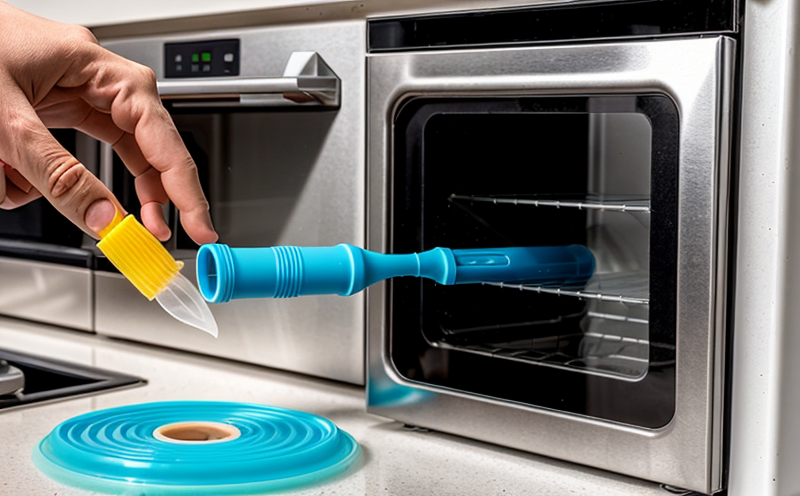ASTM D785 Plastics Rockwell Hardness Testing for Household Items
The ASTM D785 standard provides a comprehensive framework for performing Rockwell hardness testing on polymer and plastic materials. This service is particularly valuable in the household plastics sector where understanding the mechanical properties of various plastic components is crucial for quality assurance, compliance with regulations, and innovation in product design.
Rockwell hardness testing measures the indentation resistance of a material under specific loading conditions using a hard steel ball or diamond indenter. The test results are expressed as a Rockwell hardness value, which helps in assessing the relative hardness and strength of different polymer types used in household items like containers, utensils, furniture, and packaging.
For household plastics testing, ASTM D785 specifies the use of a standard 1/16 inch (1.5875 mm) diameter steel ball indenter with a 30 kgf (294.3 Newtons) preload to achieve consistent results. The test method is versatile and can be adapted for various specimen sizes, from small samples like plastic containers to larger components such as furniture parts.
The testing process involves placing the sample on a Rockwell hardness tester equipped with an appropriate indenter and scale. After applying the specified load, the indenter depth is measured using a micrometer or similar instrument. The difference between this measurement and a reference value determines the Rockwell hardness number. This procedure ensures accurate and reproducible results.
Understanding the hardness of household plastics is essential for several reasons:
- Material Selection: Ensures that materials chosen are suitable for their intended applications, such as durability in household use.
- Product Safety: Hardness testing helps identify potential safety risks associated with brittle or overly soft materials.
- Consumer Satisfaction: Consistent hardness across products enhances customer trust and satisfaction.
The ASTM D785 method is widely accepted in the industry for its reliability and repeatability. Compliance with this standard ensures that manufacturers meet regulatory requirements and can confidently market their products to consumers who expect high-quality, durable items.
For R&D engineers, understanding the hardness of new polymer blends or formulations can lead to significant improvements in product performance. Quality managers rely on these tests to maintain consistent quality across production batches, while compliance officers ensure that all testing aligns with relevant international standards and local regulations.
The Rockwell hardness test is a critical tool for evaluating the mechanical properties of plastic materials used in household items. By adhering to ASTM D785, laboratories can provide accurate, reliable data that supports informed decision-making throughout the product lifecycle from R&D to manufacturing and quality assurance.
Applied Standards
The ASTM D785 standard is specifically designed for testing the Rockwell hardness of thermoplastic materials. The test method is applicable to a wide range of household plastics, including polyethylene (PE), polypropylene (PP), polystyrene (PS), and various copolymers and blends.
The Rockwell hardness scale used in ASTM D785 employs the B scale, which ranges from 0 to 150. This scale is particularly suitable for measuring the hardness of materials with relatively low hardness values compared to other Rockwell scales like C or M.
Testing according to ASTM D785 ensures that all measurements are conducted under controlled conditions, leading to consistent and comparable results across different laboratories. The standard also specifies the preparation of specimens, including requirements for cutting, polishing, and conditioning the samples before testing.
The use of the 1/16 inch steel ball indenter with a 30 kgf preload provides a reliable method for measuring hardness without causing excessive deformation or damage to the sample. This approach ensures that the test results accurately reflect the material's intrinsic properties rather than being influenced by external factors such as surface roughness.
Compliance with ASTM D785 is essential not only for maintaining product quality but also for ensuring compliance with relevant international standards and local regulations. By adhering to this standard, manufacturers can demonstrate their commitment to excellence in material selection and testing practices.
Competitive Advantage and Market Impact
- Innovation and Product Development: Early-stage hardness testing allows R&D teams to identify optimal polymer blends for specific applications, leading to innovative product designs that meet market demands.
- Cost Efficiency: By identifying suboptimal materials early in the development process, manufacturers can avoid costly rework and waste, resulting in more efficient production processes.
- Better Product Quality: Consistent hardness across different batches ensures a high-quality product that meets customer expectations and enhances brand reputation.
- Regulatory Compliance: Adherence to ASTM D785 helps companies avoid costly non-compliance fines and penalties, ensuring they stay on the right side of regulatory requirements.
By leveraging ASTM D785 hardness testing for household plastics, manufacturers can gain a competitive edge by producing superior quality products that are safe, durable, and meet market needs. This service is not just about meeting standards but also about driving innovation and ensuring long-term success in the highly competitive consumer goods industry.
Use Cases and Application Examples
- Container Manufacturing: Testing the hardness of HDPE or LDPE used in milk jugs, water bottles, and food containers ensures they are durable enough to withstand repeated use without cracking or breaking.
- Furniture Design: Evaluating the hardness of polyurethane foams used in cushions and seating helps designers select materials that provide optimal comfort while ensuring longevity.
- Appliance Components: Assessing the hardness of plastic parts in appliances like blenders, toasters, and microwaves ensures they can withstand the rigors of daily use without wear or deformation.
- Packaging Solutions: Determining the hardness of materials used in packaging for fragile items helps manufacturers design boxes that protect contents during transit while being lightweight and cost-effective.
These examples illustrate how ASTM D785 hardness testing is integral to various aspects of household plastics production. By providing precise measurements, this service supports informed decision-making at every stage from raw material selection to final product quality assurance.





